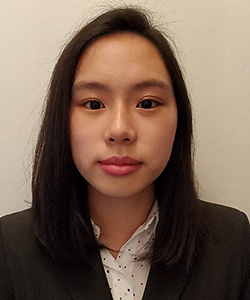Meet Sandy Ding

Degree: BS Psychology ’19
Co-ops:
Program Management Support, SAP America
Extracurricular activities: Civic 101 Teaching Assistant, Psi Chi Honor Society in Psychology
What led you to choose your major?
In my introductory psychology courses, I had a great professor who passionate about her field of study and research, and it showed in her teaching. As I took more psychology courses and got to know the department better, it became clear that the Department of Psychology was authentic in its support of student interests and learning. There hasn’t been a psychology course I didn’t enjoy, and I’ve been able to gain different research experiences just by reaching out to faculty. I’ve had a string of excellent professors and academic advisers who have made my experience with psychology an overwhelmingly positive one.
Tell us about any research experiences you’ve had as a Drexel student.
I participated in the STAR Scholars Program the summer of my freshman year, which gave me the opportunity to work closely with Dr. Nancy Raitano Lee in the Learning And Developmental Disabilities Educational Neuropsychology Research (LADDER) Lab. I also spent approximately two years as a research assistant at what is now the Drexel University Center for Weight, Eating and Lifestyle Science (WELL Center), where I worked on studies related to treatment outcomes for eating disorders. Finally, I’m completing a thesis project at the A.J. Drexel Autism Institute, examining expressive language development of children with Autism spectrum disorder in monolingual and bilingual households, under the mentorship of Dr. Diana L. Robins.
How was your co-op experience?
I completed my co-op at SAP, a software company, with the SAP University Alliances and Next-Gen program. When I was applying for co-op, I knew that I wanted an experience that was different from the experiences I gained through research, and I wanted to try out a corporate role, so this position was perfect. I worked with partnering universities to link academia to innovation and provide students and faculty with the resources to succeed in the digital future.
The best part about my co-op was that I was that I was able to leverage the skills I had developed through my psychology coursework and research experiences and apply them to a new context. This position allowed me to learn more about the intersections of technology, business, and education, and understand how psychology fits into the bigger picture. I think it reaffirmed the notion that psychology (and applications of psychology) manifests itself in many different forms. There’s not a standard template for what a psychology co-op should be, and there are many opportunities for psychology students to shape their co-op into a unique experience.
What has made your experience at Drexel special or unique?
My experience at Drexel was definitely made unique by all the opportunities to explore my interests, both academically and professionally. I’ve been able to explore research across many different avenues, experience the corporate world during my co-op, and develop an interest in education and service through my work as a teaching assistant for Civic 101. I had the opportunity to take a variety of courses in topics ranging from Sports Psychology to Database Management Systems. Through all these experiences, I’ve had the guidance of various advisers and faculty who have listened to and supported these interests, rather than trying to convince me to pursue a more traditional path for psychology. Had I been at another university, I don’t know if I would have had such an enriching undergraduate experience.
Why would you recommend your degree program at Drexel?
The psychology program at Drexel is excellent! The faculty and staff are approachable and supportive of students’ interests. We have mentorship programs designed to connect faculty and students and to allow students to learn more about current research. If you aren’t interested in research, that’s perfectly fine! The psychology program has a diverse offering of coursework for those who are interested in other aspects of psychology.
Drexel’s psychology program doesn’t attempt to put students into boxes, but rather, allows students to explore their interests and cultivate their academic and professional goals. Above all, the value of the psychology program is in the people. The psychology program truly is a place that cultivates a network of collegiality and collaboration.